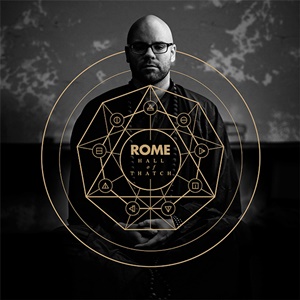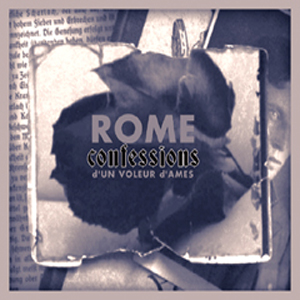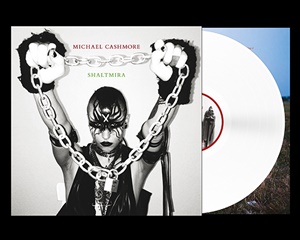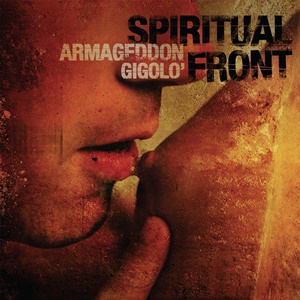Description
VÖ Datum: 19.01.2018
Label: Trisol Music Group GmbH
Format: CD
EAN Code: 4260063946066
Trisol Nummer: TRI 606 CD
Tracklisting:
1. Blighter
2. Nurser
3. Hunter
4. Slaver
5. Martyr
6. Hawker
7. Prayer
8. Keeper
9. Clemency
Infotext Deutsch: Nein, die Apokalypse ist nicht das Ende der Dinge, sie ist Teil der Schöpfung und ein immanenter Vorgang im ewigen Kreislauf von Werden und Vergehen. Ein evolutionäres “Weiter So”, das uns Erlösung vorgaukelt, gibt es nicht. Auch wenn uns Jerome Reuter alias ROME auf “Hall Of Thatch” zunächst nur mit Stimme und akustischer Gitarre gegenübertritt, wird vom ersten Ton an klar: Hier beginnt etwas Neues. Wie ein mächtiges Gewitter zieht der Sound des Albums sich über den Pforten unserer Wahrnehmung zu. ROME ist wie Vergil, der den Hörer gleich Dante an die Hand nimmt und ihn durch die Sphären unserer Grundexistenz führt. Nur wären Kategorien wie Paradies, Hölle und Fegefeuer viel zu banal, um die Abgründe der Gegenwart zu beschreiben. “Hall Of Thatch” hat eine große Wucht.
In der Vergangenheit nahm sich ROME hauptsächlich literarischer oder historischer Themen an, am besten in Kombination beider Aspekte. Jedes Album stand für sich, und doch ergab eines das andere. Auf “Hall Of Thatch” verzichtet er zumindest vordergründig auf die bisherige Metaebene, um auf dem Umweg einer persönlichen Reise eine neue Metaebene zu finden. Die CD ist viel introspektiver und nachdenklicher. ROME steuert seine Barke auf einem dunklen Bewusstseinsstrom. “Auf den anderen zehn Alben nutze ich ja meist einen politischen, historischen oder philosophischen Kontext, um meine eigenen Querelen auszubreiten. Hier ist es mehr das Persönliche, aber eher auf metaphysischer, transzendentaler Ebene. Wohin passt der Körper im Bereich zwischen Geist und Welt? Es geht weder um Zeitgeschehen noch um Politik, sondern um einen Prozess von Erkenntnis, der noch lange nicht abgeschlossen ist.”
“Hall Of Thatch” hat eine lange Vorgeschichte. Jerome Reuter hatte sich vor Jahren auf den Weg nach Vietnam begeben. Die Kultur und der Bezug zum Buddhismus faszinierten ihn ebenso wie die Lebensart der Menschen, die wirklich ein halbes Jahrhundert zuvor die Apokalypse erlebt hatten. In regelmäßigen Abständen gab er Konzerte im südöstlichsten Zipfel des asiatischen Festlands und fuhr im Anschluss auf dem Moped quer durchs Land. Er selbst nennt es seinen Field-Recording-Trip. Viele dieser Gesänge und Gebete fanden ihren Weg auf das Album und bildeten den Rahmen für die neuen Songs von ROME.
Nun heißt es ja immer, Buddhismus sei leicht. Bei aller Beschäftigung mit buddhistischen Gedanken ist “Hall Of Thatch” trotzdem eine gregorianische Schwere eigen. Für Reuter besteht das buddhistische Element im erfolgreichen Kampf mit den eigenen inneren Dämonen. “Das Album ist nicht das friedvolle Endprodukt jenes Wesens, das man zu guter Letzt sein will, sondern es bringt den Kampf zum Ausdruck, der an diesen Punkt führt. In der Realität haben wir ja eher Schwierigkeiten loszulassen. Diese Verhandlung auf dem Weg von dem einen zu dem anderen Zustand versuche ich auf dem Album hörbar zu machen. Wo stehe ich, wer bin ich, wer will ich sein, wo will ich hin, und was muss ich dafür aufgeben? Die Songs sind die einzelnen Stationen dieser Reise. Der letzte Song ist friedlicher als die anderen. Da habe ich schon etwas erreicht. Es ist aber nicht der Gipfel des Mount Everest, sondern eher das Basislager. Über mehr kann ich nicht singen, denn weiter bin ich noch nicht.”
Um zu diesem Gipfel zu kommen, muss man manchmal durch die Hölle wie Dante an der Hand des Vergil. Der Grundton von ROME war schon immer massiv, doch so düster und wuchtig wie auf “Hall Of Thatch” ging es noch auf keinem bisherigen Album des Projektes zu. Reuter räumt Lichtblicke ein, gibt aber auch zu, dass es diesmal kein Entrinnen gibt. Man kann sich in diese Musik nicht einfach fallen lassen. ROME vergleicht es mit einer satanischen Drehorgel, in die man reingeschmissen wird, ohne unbeschadet wieder rauskommen zu können. In dieser Hinsicht lässt sich das Album in eine Reihe mit Acts wie Wovenhand, Foetus, Swans oder Steve Von Till einordnen. Obwohl die neue CD auf den ersten Blick nichts mit aktueller Politik zu tun hat und schon gar kein Protestalbum ist, ergibt es doch einen sehr treffenden Soundtrack zu unserer Zeit. ROMEs Credo lautet, die Zeit der Banaliäten ist vorbei. “Die Musik ist frei von jeder Utopie oder anderen Werten, die Politik oder Geschichte liefern können. Die Ausgangslage ist hoffnungslos. Man kommt dem Zustand der Welt auf den üblichen Lösungswegen nicht mehr bei. Wir suchen nach neuen Erklärungen, können aber nichts an eine höhere Instanz abgeben, sondern müssen uns alle Antworten selbst erarbeiten. Das ist harte Arbeit, bei der man beide Füße im Dreck hat. In dieser Hinsicht ist das Album sicher eine Reaktion auf das, was gerade vor sich geht. Die meisten Krankheiten, die wir heute haben, sind politische Krankheiten. Wenn die Außenwelt zu krass wird, reagieren wir mit dem ganzen Körper und kollabieren.”
Wumm! Ein Statement wie ein Meteorit, dessen Einschlag die Erde in Dunkel hüllt. Das Album soll keine Flucht sein, betont Reuter. Trotzdem oder gerade deshalb wird ROME auch zum Phoenix. Indem er sich in und auf sich selbst zurückzieht, beschreibt er seine eigene Auferstehung. Dieses Moment verleiht dem Album die Kraft, Größe und Erhabenheit. Die Songs wirken wie eine gespannte Sehne, die darauf wartet, den Pfeil abzuschießen. Das mag wie ein Widerspruch in sich selbst anmuten, und es ist nicht das einzige Paradoxon dieser Platte. Der Luxemburger Reuter hat sich längst als überzeugter Europäer geoutet. “Hall Of Thatch” ist nun das bisher amerikanischste seiner Alben, aber in diesem Amerikanischsein ist es wiederum sehr europäisch. Die CD beschreibt einen vorläufigen Endpunkt in der Entwicklungskurve von ROME und zugleich die Ausgangsbasis für Künftiges. Die Songs sind charismatisch, ohne missionarisch zu sein. Sie besingen tiefenpsychologisch den Zustand unserer Zeit, werfen sich aber weder zur Weltenrettung noch zur Weltenkündung auf. Sie sind infernalisch, aber zugleich sehr intim und verletzlich. Jerome Reuter kommt ohne jegliche Ecce-Homo-Pose aus. Letztlich ist es – wieder einmal – ein ebenso stringentes wie ergreifendes Werk eines Musikers, der sich von Platte zu Platte weiterentwickelt. So hat er den Mut zu sagen. “Das Album ist, was es ist. Daraus ergibt sich erstmal – Nichts. Ich habe alles gesagt und bin mit meinem Latein am Ende.” Ein überaus stimmiges Fazit für ein Album, das buddhistisch ausgerichtet ist und gregorianische Grundzüge trägt.
InfotextEnglisch: No, the Apocalypse is not the end of things; it’s a part of creation and an immanent process in the eternal cycle of becoming and ceasing to be. There is no evolutionary ‘thread’ that leads us to believe in redemption. Even though on ‘Hall of Thatch’, Jérôme Reuter – alias ROME – initially only confronts us with voice and acoustic guitar, one thing is clear from the first note: This is the beginning of something new. Like some dark, powerful storm, the album’s sound draws over the threshold of our perception. Rome much like Vergil, who as with Dante, takes the listener by the hand and leads him through the spheres of our base existence. Terms such as paradise, hell and purgatory, however, would be much too banal to describe the abysses of the present day. ‘Hall of Thatch’ has an enormous impact.
Previously, ROME mainly addressed literary or historical topics, and preferably a combination of both aspects. Each album stood on its own, yet each begat the other. At least superficially, on ‘Hall of Thatch’ he dispenses with that previous metaplane, in order to discover a new arena on the detour of a personal journey. The CD is much more introspective and thoughtful than most previous releases. ROME steers his boat down a dark stream of consciousness. “On the other ten albums (leaving out “Hell Money” here), I mostly used a political, historical or philosophical context in order to disseminate my thoughts.On this one it’s rather more personal, but more on the metaphysical, transcendental plane.Where does the body fit in that realm between the spirit and the world?It’s neither about current events nor politics, but rather about a process of realisation that’s still some way off from being completed.”
There’s a history to ‘Hall of Thatch’, however. Some years go, Jérôme Reuter set off for Vietnam. The country, its history, the culture and its relationship to Buddhism fascinated him just as much as the lifestyle of the people, who really did experience the Apocalypse half a century ago. At regular intervals, he played concerts at the most south-easterly point of the Asian mainland, and afterwards travelled across the land by moped. He himself called it his field recording trip. Many of these chants and prayers found their way onto the album, forming the framework for ROME’s new songs.
Now, it can be said that Buddhism is an easy subject matter. But despite tackling basic Buddhist thought, a Gregorian seriousness is nevertheless immanent in ‘Hall of Thatch’. For Reuter, the spiritual element is present in the successful battle with his own inner demons. “The album is not the peaceful end product of that peaceful being that you eventually want to become, but it focuses the struggle that leads to this point.We obviously tend to have difficulties in letting go.On the album I try to make this negotiation along the journey from one state to another audible.Where am I, who am I, what would I like to be, what must I surrender to achieve this?The songs are the individual stopping points on this journey.The final song is more placid than the others.There’s something of an achievement there for me, but on a very small level.It’s not the peak of the holy mountain, merely the base camp.That’s all I can sing about, because I’ve not yet been any further.”
And in order to reach this peak, you sometimes have to go through hell, just as Dante did while holding Vergil’s hand. ROME’s basic sound has always been massive, but on none of the project’s previous albums was it ever so dark and powerful as on ‘Hall of Thatch’. Reuter grants rays of light here and there, but admits that this time there is no escape. This is not music that you can just flop down to. ROME compares it to being thrown into some satanic barrel organ, where you are never able to come out of it unscathed. In this regard, the album can be filed in a row with those of acts such as Wovenhand, Foetus, Swans or Steve Von Till. Although at first glance, the new CD doesn’t have anything at all to do with current politics and is definitely not a protest album, it does indeed serve as an appropriate soundtrack to our times. ROME’s motto is that the time of banality is past. “The music is free of any kind of utopia or other values that politics or history could deliver.The status quo is utterly hopeless.You can no longer get to grips with the state of the world by deploying the usual approaches.We’re searching for new explanations, but can’t cede anything to a higher authority. Instead, we must all work out the answers ourselves.That’s hard work, and you’re standing there with both feet in the mud.In this respect, the album is definitely a reaction to all that’s going on right now.The majority of the diseases we have today are political diseases.When the outside world becomes just too much, we react with our entire bodies and collapse.”
Bang! A statement like a meteorite whose impact envelopes the Earth in darkness. The album is not supposed to be an escape, emphasises Reuter. Nevertheless, or perhaps because of this, ROME becomes a phoenix. By withdrawing into himself, he is able to describe his own resurrection. This moment is what imbues this album with its power, splendour and grandeur. The songs feel like a tautened bow that is waiting to fire the arrow. That may appear to be a contradiction in itself, but it’s not the only paradox on this record. The Luxembourger Reuter outed himself as a staunch European long ago. But ‘Hall of Thatch’ is the most American of his albums to date, although this Americanness can in turn be seen as being very European. The CD characterises a provisional end point in ROME’s development curve, yet at the same time forms a basis for the future. The songs are charismatic without being missionary. In the manner of depth analysis, they sing of the state of our times, yet set themselves up as neither the rescuer nor herald of worlds. They are infernal, yet at the same time very intimate and vulnerable. However, Jérôme Reuter manages this without any kind of Ecce homo posing. Ultimately, it’s – once again – the stringent yet equally gripping work of a musician who always develops from album to album. He therefore has the courage to say, “The album is what it is.What emerges from it is presumambly… Nothing.I’ve said what I had to say and that’s all there is to it.” An exceedingly apt conclusion befitting an album that nods towards Buddhism yet displays Gregorian features.









